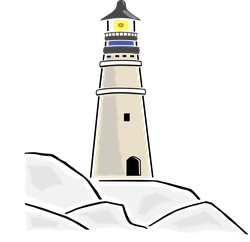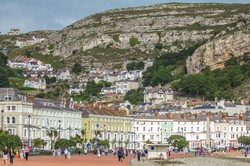Writers and poets quite often elaborate facts and rewrite history, which is what has happened with the strange and unprecedented disappearance of three lighthouse keepers in 1900 in Scotland. The original reports of the mystery are kept at Trinity House, which is the organization dealing with British and Irish lighthouses. But a poet presented a dramatic account of the mystery, which has had more impact in the popular consciousness than the more sober reports and deliberations of a commission of inquiry.

The mystery of Flannan Isle
by frankbeswick
There is a simple solution to the disapparance of three lighthouse keepers in 1900.
The Disappearance
Though three men dwelt on Flannan Isle
To keep the lamp alight
As we steered under the lee we caught
No glimmer through the night
Wilfred Wilson Gibson, 1912
Gibson tells the tale in the first person plural, so many think that he was an eye witness, but he was not, he was a professional writer. He told his version of the event, which occurred in 1900, in 1912 and took some licence with the facts, though the case was broadly as he described it. Now that I have used the poem for effect, I will use it no more.
So where are the Flannan Isles? They are an uninhabited archipelago of rocky islets in the Atlantic twenty miles west of the Isle of Lewis. They are sometimes known as the Seven Hunters,for the name Flannan derives from the Gaelic for hunter, and this indicates that never in Scotland's history were they inhabited by a settled community, but were places for seal hunters to visit in good weather. In Winter, Spring and Autumn gales send seas towering over the islets with massive power. But the lighthouse was constructed in 1899 by the famous Stevenson family, great lighthouse engineers from whom Robert Lewis Stevenson sprung. But for the three keepers they were a daunting and lonely tour of duty for which relief visits by the lighthouse tender were an eagerly awaited blessing.
On 16th December 1900 it was reported that the light had not been lit, and while Gibson makes out that rescuers set off immediately, reports say that the stormy seas prevented the lighthouse tender Hesperus from reaching the isles until the 27th December.In the meantime the light remained unlit, its absence jeopardising sailors along that turbulent coast.
Captain Harvie of the Hesperus noted that the lighthouse flag was not flying. This was a breach of protocol, for the lighthouse should acknowledge the visiting vessel. Desperate to think that the keepers had not seen his approach, he had the foghorn boom several times, but there was no response. Finally in a last act of hope he fired off a rocket. But nothing happened.
Finally, Harvie ordered a boat to launch and sent a crew to the island. It tied up at the rocky landing stage on the eastern, leeward side of the isle. The crew's leader, officer Moore, went ashore, full of trepidation about what he would find, or what he would not. Trembling he ascended the steps towards the silent structure.
What Moore Found
There are varying reports,but the lighthouse door was ajar, and when Moore entered there were no signs of life. A diary had been written for the fifteenth of December, the last day the lamp was lit. There are some reports that a meal rotted on the table. Three places were set, but none had eaten anything. Reports speak of one chair having been toppled over, as if the one sitting in it had jumped up to deal with an emergency that made him rush out. Gibson speaks of a canary starving on its perch, but Moore does not mention this fact. Having done a tour of the lighthouse, he found everything was ship shape, which means that it was tidy and well-stowed, but of the three keepers he found no sign. Keepers Ducat, Marshall and relief keeper MacArthur were gone.
One rule had been broken. One keeper must stay in the lighthouse at all times, so if one had rushed out an emergency must have been occurring.
Moore returned to the vessel and reported to Harvie, who sent him back and told him and MaCormack to explore the island. There were no human traces anywhere, the keepers were gone, but a few significant facts were noted. There was storm damage at a landing stage on the west of the island, where safety railings had been torn off by wind and waves. It was also noted that the sea boots of Ducat and Marsall were missing, indicating that they had gone outdoors wearing them. They were also wearing coats. But MacArthur's coat was still present on its hanger, indicating that he had gone outdoors very quickly without time to put it on. This sounds as if he exited in a hurry, But why?
Captain Harvie decided to leave a crew of four men on the island while he reported to the lighthouse authorities and had a replacement crew brought in. . By this time the crew knew that the three keepers were dead.
There was the statutory board of inquiry into the disappearance, but the board left the judgment open. No one could say why the three keepers had disappeared, but foul play was never suspected. This did not prevent speculation from thriving.
The Explanation
Strange theories abounded, especially after Gibson dramatized the story in his poem, which was included in Palgrave's Golden Treasury of Longer Poems. Freakish theories of the keepers having been attacked by a sea monster or taken by UFOs have sprung up over the years. Paranormal theories about ghosts of dead sailors shipwrecked on the Flannans driving the keepers off have occasionally been mooted. We can dismiss these. Suggestions of murder and suicide are credible, but there is no evidence of there having been bad relations between the three men. But for the sailors on the Hesperus there was one very likely explanation, which is less spectacular than the esoteric ones, but is the most likely. A giant wave!
In 1974 when working in a coastal town I shared lodgings with some Scottish sailors,one of whom, a genial, well-balanced and thoroughly pleasant young man from Northern Scotland who was called Alex told me of an experience he had had when serving on an oil tanker. He had been on the bridge and had gone outside for some air, only to see a wave approaching that towered over the tanker's bridge. He dived inside and slammed the door shut, and seconds later a massive sea rocked the tanker, which fortunately survived. Sailors were telling tales of giant waves, only for some scientists to dismiss them. But in more recent years scientific evidence of very large waves has been found. A few years ago a cruise liner in the Antarctic was badly damaged by one.
So here is what I think happened. Ducat and Marshall had gone to inspect the damaged landing place on the west of the island, leaving MacArthur to prepare the meal and stay in the lighthouse according to rules. But from his vantage point MacArthur espied through a window a large wave thundering in and saw his mates' danger. Without a coat he leapt up and raced down to the landing stage where his mates were, but too late. He perished alongside them as the wave roared over the islet.
A sad tale about lives cut short, but the simple explanation of the mystery preferred by experienced seamen is the most credible explanation. The sea is to be respected.
Boots
You might also like
A Strong Woman's StoryJane Evans went to War, but fought no one, for her mission was mercy and kind...
Sarn Helen. Through Wales on footSarn Helen is a Roman route which travels Wales from South to North, and the...





 TheThousand Year Gardenon 11/26/2025
TheThousand Year Gardenon 11/26/2025
 Women of the Gospelson 10/11/2025
Women of the Gospelson 10/11/2025
 Religious Gardenson 08/25/2025
Religious Gardenson 08/25/2025
 Doctor of the Church: John Henry Newmanon 08/03/2025
Doctor of the Church: John Henry Newmanon 08/03/2025



Comments
Probably it was for their own consumption. The Norwegians had seal meat of their own.
Thank you for your comment below in answer to my previous, same-day observation and question.
Would Flannan Isle hunters have kept their seal meat and skins to themselves or would they have traded with hunters from Norway or Iceland or Greenland?
Subsistence culture in Western Scotland and Ireland. Combine crops, fishing and hunting.
Thank you for your comment below in answer to my previous observation and question.
Seal meat and skins correlate in my mind more with Inuit culture than with British, English, Gaelic, Irish, Norse, Scottish cultures.
What culture did the seal hunters of Flannan isle embrace?
Meat and skins.
Thank you for your comment below on Oct. 31, 2022, in answer to my previous, sme-day observation and question.
Online sources describe seal meat as cholesterol-low and protein-high. Did Flannan Isle hunters hunt island seals for meat or for something else?
The etymology of Flannan Isle is that its name means hunter's island. People probably went there to hunt seals. You are probably right about the etymology of Fanad,as sloping ground describes the place well.
Elsewhere, you indicated that you and your wife have visited Fanad Head.
Here, you mention the etymology for Flannan Isles.
Since they are both Gaelic "F" -- ;-D -- words, would you happen to know the etymology of Fanad (which Wikipedia suggests as speculatively from the old Gaelic Fana for "sloping ground")?
Derdriu, you seem to have got the right explanation.
frankbeswick, Thank you for giving what is also a kind tribute to three lighthouse keepers who were just doing their jobs and for mentioning Robert Louis Stevenson, one of the first authors I remember as being a favorite.
Do you think that the wave came so quickly that Ducat and Marshall -- perhaps their backs were waveward and their faces landward? -- didn't even see it? Perhaps MacArthur had the panoramic view from inside the lighthouse and saw the wave forming and thought that he had time to caution his co-workers and remove them from the scene.
On this side of the pond, one of the explanations for the disappearance of the Mary Celeste is a rogue wave.